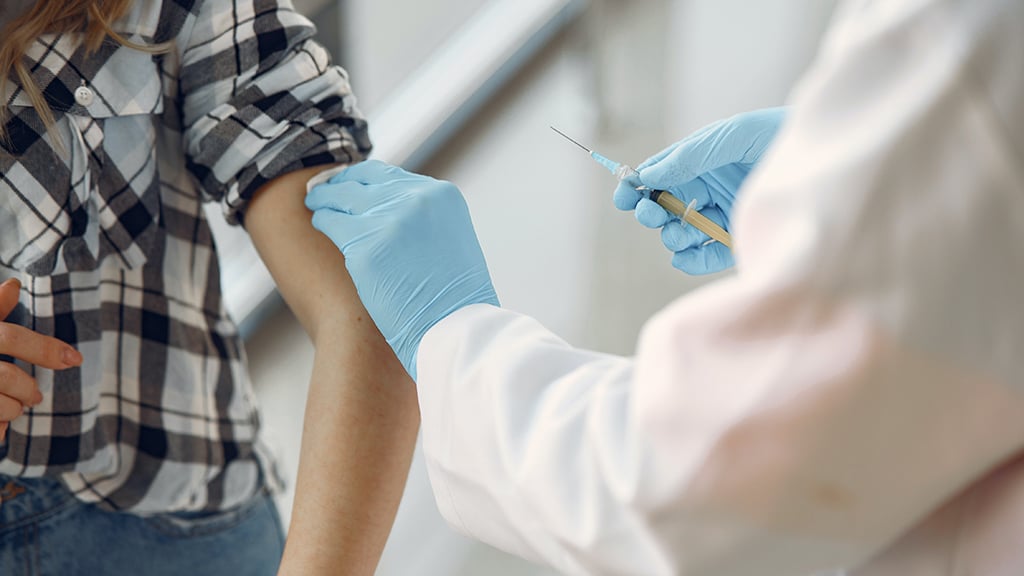Unsure about getting a COVID‑19 vaccination? Here’s some helpful info
In the earlier stages of the pandemic, public health experts explained we’d need to maintain hand hygiene, social distancing and intermittent mask-wearing until there was a vaccine. Now we have a vaccine – several, in fact – but not everyone wants to get the jab.
Concerns about vaccination side effects and efficacy, a lack of urgency due to low rates of COVID-19 and a frustratingly slow vaccine rollout have all contributed to a phenomenon psychologists call ‘vaccine hesitancy’. A recent survey found 42 percent of Australians report some degree of vaccine hesitancy.
Dr Mathew Ling from Deakin’s School of Psychology says vaccine hesitancy can be mapped on a continuum from vague concern to outright refusal. ‘Some people will get vaccinated according to the intended schedule, but they still have concerns and are hesitant about engaging in that behaviour. Others will manifest this hesitancy in more practical terms by delaying a vaccine or refusing it outright.’
Thankfully, it’s possible to overcome vaccine hesitancy, and understanding how it works is an important first step.
The three Cs of vaccine hesitancy
Dr Ling says vaccine hesitancy is influenced by a combination of what experts have dubbed the ‘three Cs’:
- Confidence is the degree to which you trust the vaccine is efficacious and safe. ‘If you don’t think the vaccine is going to be effective or safe, you won’t take it,’ Dr Ling says. ‘Concerns about vaccine reactions like blood clots, for example, are focused on a lack of confidence.’
- Complacency occurs when the risk of catching the disease, as well as the harm it may cause, is perceived as low. Dr Ling says it plays out in two ways in Australia: ‘Our relatively low rates of COVID‑19 can mean people don’t perceive themselves to be at risk, and even if they do catch the disease it might not cause much harm, which means they’re less likely to get the vaccine’. Countries like the US and UK that have lived through the devastation of COVID‑19 have much less complacency and, as a result, much higher vaccination rates.
- Convenience relates to how easy it is to get the vaccine. ‘If it’s difficult or unpleasant to get the vaccine, then you’re less likely to get it,’ Dr Ling says. Can’t get through to the coronavirus hotline to book your vaccine or your GP is always out of stock? That’s inconvenient.
When circumstances change
When any or all of the three Cs shift, so too can vaccine hesitancy.
Melbourne’s latest outbreak and subsequent lockdown has given it a good shake, with people in the state and around the country rushing to get vaccinated. ‘Once the cases started increasing, it reduced complacency and helped to offset any hesitancy associated with confidence,’ Dr Ling says.
But he says changing advice about which vaccine is best for different age groups, and even the option to choose between two types of vaccines for some cohorts, may have an ongoing negative impact on confidence.
‘It’s not just that you’re offsetting your concerns about COVID-19 against your concerns about the vaccine – it’s not just a binary choice because you have a third option of another type of vaccine,’ Dr Ling says. ‘That provides potential opportunities for people to experience some uncertainty. It’s something we’re not very comfortable with and could motivate us to make no choice and just wait and see what happens.’
The media, too, can shape our perception of the three Cs – for better or worse. ‘It’s entirely in the public interest to know about the rates of people developing blood clots, but the way the information has been delivered has really contributed to concern about vaccine safety,’ Dr Ling says.
Combating vaccine hesitancy
Improving access to vaccines is a no-brainer. ‘We need to make it as convenient as possible for people to get vaccinated – make it clear where they can get the vaccine, how they can get the vaccine and mention any additional requirements,’ Dr Ling says.
Clear communication from influential institutions like government and the media is key in increasing confidence in the vaccines and reducing complacency. ‘It’s really important that there is consistent information to inform people about the fact that the vaccines are safe, to alert them in a way that’s not scaremongering that there are vaccine risks, and to trade those off against the benefits of being able to have the population be vaccinated,’ Dr Ling says.
Public figures like celebrities or prominent people in local communities can also help to get the message across and normalise the experience of getting vaccinated. ‘Encouraging people to pass on their vaccination behaviour to others by demonstrating that they have been vaccinated is a good way to encourage people to slowly adopt it.’
And you don’t need to be a celeb to do your bit to help reduce vaccine hesitancy. Tell your friends that you – or your parents or colleagues or neighbours – have been vaccinated. Take a selfie with the band-aid on your arm. Overshare on social media. Promote vaccine pride.
‘It’s one thing to have an authority figure tell you, but it’s another to have someone in your family or social circle telling you, “I’ve had it and it’s safe”’.
*Edited version of an article originally published on this.
